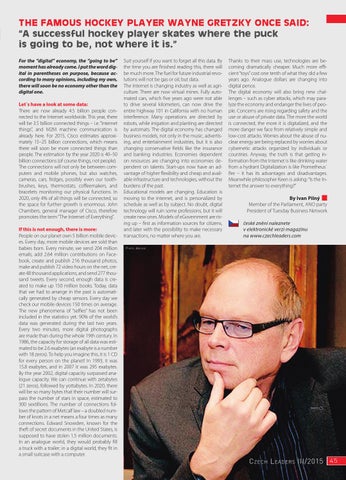THE FAMOUS HOCKEY PLAYER WAYNE GRETZKY ONCE SAID: “A successful hockey player skates where the puck is going to be, not where it is.” For the “digital” economy, the “going to be” moment has already come. I put the word digital in parentheses on purpose, because according to many opinions, including my own, there will soon be no economy other than the digital one. Let´s have a look at some data: There are now already 4.5 billion people connected to the Internet worldwide. This year, there will be 3.5 billion connected things – i.e. “Internet things”, and M2M machine communication is already here. For 2015, Cisco estimates approximately 15–25 billion connections, which means there will soon be more connected things than people. The estimation by the year 2020 is 40–50 billion connections (of course things, not people). The connections will not only be between computers and mobile phones, but also watches, cameras, cars, fridges, possibly even our toothbrushes, keys, thermostats, coffeemakers, and bracelets monitoring our physical functions. In 2020, only 4% of all things will be connected, so the space for further growth is enormous. John Chambers, general manager of Cisco, therefore promotes the term “The Internet of Everything”. If this is not enough, there is more: People on our planet own 5 billion mobile devices. Every day, more mobile devices are sold than babies born. Every minute, we send 204 million emails, add 2.64 million contributions on Facebook, create and publish 216 thousand photos, make and publish 72 video hours on the net, create 48 thousand applications, and send 277 thousand tweets. Every second, enough data is created to make up 150 million books. Today, data that we had to arrange in the past is automatically generated by cheap sensors. Every day we check our mobile devices 150 times on average. The new phenomena of “selfies” has not been included in the statistics yet. 90% of the world’s data was generated during the last two years. Every two minutes, more digital photographs are made than during the whole 19th century. In 1986, the capacity for storage of all data was estimated to be 2.6 exabytes (an exabyte is a number with 18 zeros). To help you imagine this, it is 1 CD for every person on the planet! In 1993, it was 15.8 exabytes, and in 2007 it was 295 exabytes. By the year 2002, digital capacity surpassed analogue capacity. We can continue with zetabytes (21 zeros), followed by yottabytes. In 2020, there will be so many bytes that their number will surpass the number of stars in space, estimated to 300 sextillions. The number of connections follows the pattern of Metcalf law – a doubled number of knots in a net means a four times as many connections. Edward Snowden, known for the theft of secret documents in the United States, is supposed to have stolen 1.5 million documents. In an analogue world, they would probably fill a truck with a trailer; in a digital world, they fit in a small suitcase with a computer.
Suit yourself if you want to forget all this data. By the time you are finished reading this, there will be much more. The fuel for future industrial revolutions will not be gas or oil, but data. The Internet is changing industry as well as agriculture. There are now virtual mines. Fully automated cars, which five years ago were not able to drive several kilometers, can now drive the entire highway 101 in California with no human interference. Many operations are directed by robots, while irrigation and planting are directed by automats. The digital economy has changed business models, not only in the music, advertising, and entertainment industries, but it is also changing conservative fields like the insurance and banking industries. Economies dependent on resources are changing into economies dependent on talents. Start-ups now have an advantage of higher flexibility and cheap and available infrastructure and technologies, without the burdens of the past. Educational models are changing. Education is moving to the Internet, and is personalized by schedule as well as by subject. No doubt, digital technology will ruin some professions, but it will create new ones. Models of eGovernment are rising up – first as information sources for citizens, and later with the possibility to make necessary transactions, no matter where you are.
Thanks to their mass use, technologies are becoming dramatically cheaper. Much more efficient “toys” cost one tenth of what they did a few years ago. Analogue dollars are changing into digital pence. The digital economy will also bring new challenges – such as cyber attacks, which may paralyze the economy and endanger the lives of people. Concerns are rising regarding safety and the use or abuse of private data. The more the world is connected, the more it is digitalized, and the more danger we face from relatively simple and low-cost attacks. Worries about the abuse of nuclear energy are being replaced by worries about cybernetic attacks organized by individuals or countries. Anyway, the truth is that getting information from the Internet is like drinking water from a hydrant Digitalization is like Prometheus´ fire – it has its advantages and disadvantages. Meanwhile philosopher Keen is asking: “Is the Internet the answer to everything?” By Ivan Pilný Member of the Parliament, ANO party President of Tuesday Business Network české znění naleznete v elektronické verzi magazínu na www.czechleaders.com
P hoto : A rchive
C zech L eaders III/2015
45
